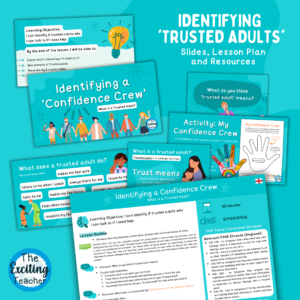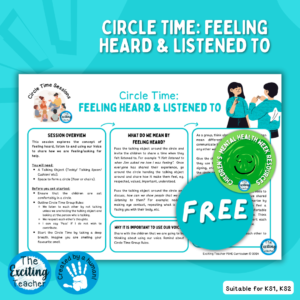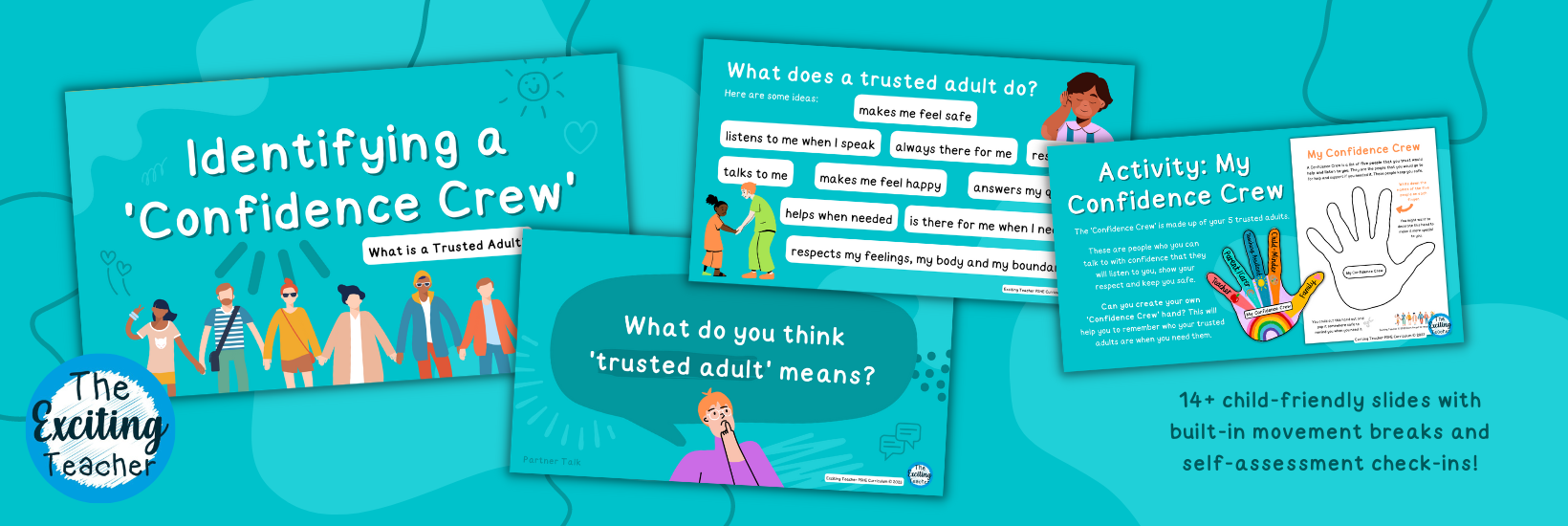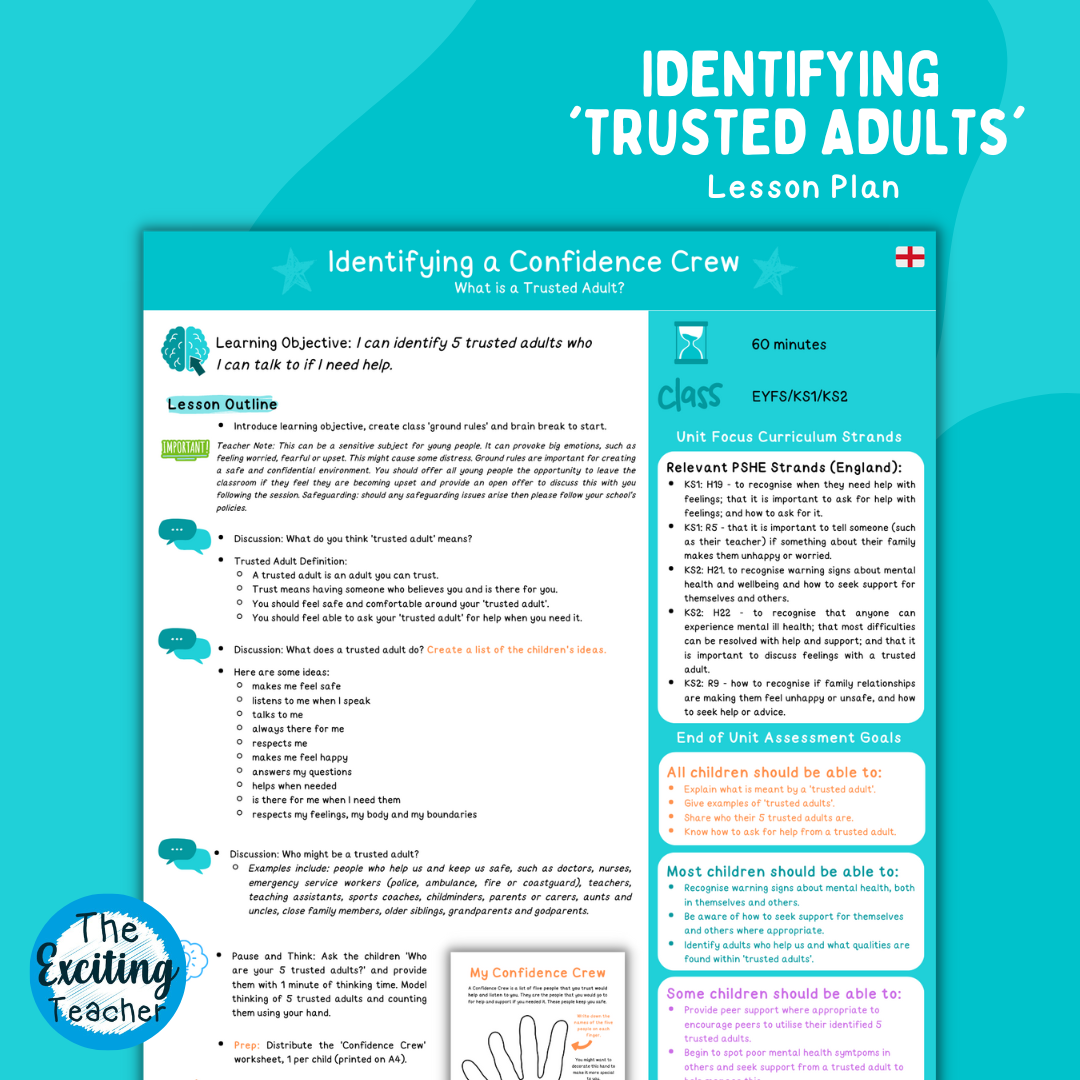'Identifying a Confidence Crew': What is a Trusted Adult? (Lesson Pack)

This is a Lesson Pack designed to support with helping children to identify a ‘Confidence Crew’ of Trusted Adults. It has been designed to support all children in all year groups.
Learning Objective: I can identify 5 trusted adults who I can talk to if I need help.
- Explain what is meant by a ‘trusted adult’.
- Give examples of ‘trusted adults’.
- Share who my 5 trusted adults.
- Know how to ask for help from a trusted adult.
How could this resource be used?
- To support children with identifying trusted adults who they can speak to when feeling worried, uncomfortable or seeking support.
- To encourage children to identify when they need further support for their mental health, both spotting warning signs in themselves and others.
Download the Lesson Pack below!
Relevant Curriculum Links:
England PSHE – Which statutory PSHE curriculum* objectives does this resource fall into? *in line with the PSHE Association 2021 Statutory Guidance.
KS1:
- H19. to recognise when they need help with feelings; that it is important to ask for help with feelings; and how to ask for it.
- H34. basic rules to keep safe online, including what is meant by personal information and what should be kept private; the importance of telling a trusted adult if they come across something that scares them.
- R12. that hurtful behaviour (offline and online) including teasing, name-calling, bullying and deliberately excluding others is not acceptable; how to report bullying; the importance of telling a trusted adult.
KS2:
- H19. a varied vocabulary to use when talking about feelings; about how to express feelings in different ways.
- H20. strategies to respond to feelings, including intense or conflicting feelings; how to manage and respond to feelings appropriately and proportionately in different situations.
- H21. to recognise warning signs about mental health and wellbeing and how to seek support for themselves and others.
- H22. to recognise that anyone can experience mental ill health; that most difficulties can be resolved with help and support; and that it is important to discuss feelings with a trusted adult.
Scottish Health and Wellbeing Curriculum Outcome(s):
- Mental and Emotional Wellbeing:
- I am aware of and able to express my feelings and am developing the ability to talk about them. HWB 0-01a / HWB 1-01a / HWB 2-01a / HWB 3-01a / HWB 4-01a.
- I understand that there are people I can talk to and that there are a number of ways in which I can gain access to practical and emotional support to help me and others in a range of circumstances. HWB 0-03a / HWB 1-03a / HWB 2-03a / HWB 3-03a / HWB 4-03a.
- I understand the importance of mental wellbeing and that this can be fostered and strengthened through personal coping skills and positive relationships. I know that it is not always possible to enjoy good mental health and that if this happens there is support available. HWB 0-06a / HWB 1-06a / HWB 2-06a / HWB 3-06a / HWB 4-06a.
More amazing resources you might like:
- All
- 5 Point Scale
- Behaviour Management
- Bullying and Anti-Bullying
- Christmas
- Death and Grief
- EYFS
- Emotional Literacy
- Emotional Regulation
- Emotions and Feelings
- Goal Setting
- KS1
- KS2
- Lesson Plans
- Managing Hurtful Behaviour and Bullying
- Mental Health
- Mindfulness
- Ourselves, Growing and Changing
- Seeking Support
- Self-Esteem
- Self-Love
- The Scribbles Crew
- Zones of Regulation

Advent: ‘Sweet Times Ahead’ Memories of the Year Reflections & New Years Resolutions

The Exciting Teacher Wellbeing Summer Project 2022

‘Zones of Investigation: The Case of Minty Paws Green and the Lost Calm Strategies’ Code Breaking Activity

‘I Need Help’ Desk Prompt Cards

‘Identifying a Confidence Crew’: What is a Trusted Adult? (Lesson Pack)

How does Grief affect my body?

I wish my teacher knew…

My Feelings Check-In: Self-Regulation Pathway for Coping with Big Feelings

The Scribbles Crew – 5 Point Scale: Lanyard Prompts

FREE: ‘Feeling Heard & Listened To’ Circle Time Session Plan (Children’s Mental Health Week 2024 Resources)
Share this resource:
Facebook
Pinterest
Twitter
WhatsApp
Email
Print
Request a Resource
Want to request or suggest a resource? Pop us a message below and we will see what we can do. We are not able to respond directly to all requests but be rest assured, we are reading them and constantly updating the resource bank accordingly to all your fabulous ideas!
Tagged Anti-Bullying, Bullying, KS1, KS2, Mental Health, Relationships, Wellbeing


